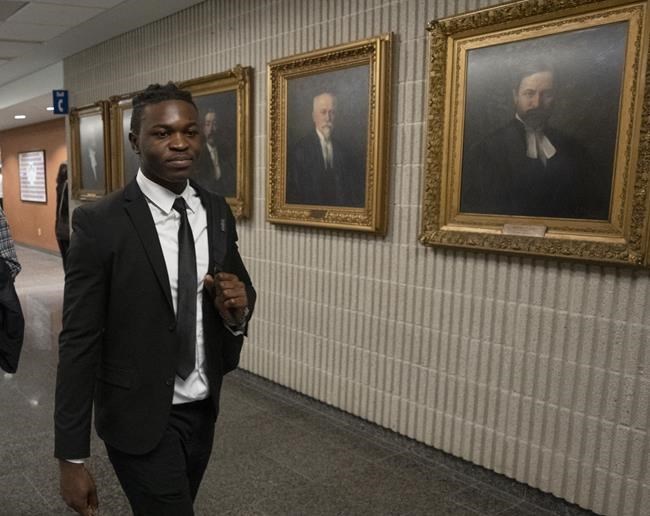MONTREAL — A Quebec Superior Court judge has invalidated laws that allow police to randomly pull over drivers for traffic stops.
Justice Michel Yergeau ruled Tuesday on a constitutional challenge to random stops, writing that racial profiling exists and that it's a reality that weighs heavily on Black people.
“As a society, we cannot wait for a part of the population to continue to suffer in silence in the hope that a rule of law will finally receive from the police services an application that respects the fundamental rights guaranteed by the Charter," Yergeau wrote.
"Racial profiling does exist. It is not a laboratory-constructed abstraction ... It is a reality that weighs heavily on Black communities. It manifests itself in particular with Black drivers of motor vehicles."
The challenge heard this year was brought by Joseph-Christopher Luamba, a Black Montreal resident who said he had been stopped by police nearly a dozen times without reason, at least half of which when he was behind the wheel. None resulted in a ticket.
The Canadian Civil Liberties Association intervened on his behalf, arguing that random stops by police violate equality rights guaranteed under the Canadian Charter of Rights and Freedoms and create opportunities for racial profiling.
Luamba, 22, and the civil rights group challenged the power of Canadian police to stop drivers without a reasonable suspicion that an offence had been committed. They did not challenge structured police traffic stops such as drunk-driving checkpoints.
‚ÄúThe preponderant evidence shows that over time, the arbitrary power granted to the police to carry out roadside stops without cause has become for some of them a vector, even a safe conduit for racial profiling against the Black community," Yergeau wrote.¬Ý
"The rule of law thus becomes ... a breach through which this sneaky form of racism rushes in."
Yergeau's ruling overturns the rules established by a 1990 Supreme Court decision, R. v. Ladouceur, where the high court ruled that police were justified when they issued a summons to an Ontario driver who had been stopped randomly and who had been driving with a suspended licence.
The high court ruled that random stops were the only way to determine whether drivers are properly licensed, whether a vehicle's seatbelts work and whether a driver is impaired.
But Yergeau wrote it was time for the justice system to declare this power, which violates certain constitutional rights, obsolete and inoperable, as well as the article of Quebec's provincial Highway Safety Code that allows it.
Still, Yergeau wrote that the ruling applies specifically to the random stops. He said the ruling is not meant to be an inquiry report on systemic racism involving racialized or Indigenous Peoples.
The judge also said the ruling is not about racism within police forces, saying the court heard no evidence in this regard, nor did it draw a conclusion.
But he noted that "racial profiling can sneakily creep into police practice without police officers in general being driven by racist values."
Lawyers for the Canadian and Quebec governments argued that the Supreme Court was right to uphold the rule allowing random stops, which they say is an important tool for fighting drunk driving.
Police forces testified about the different efforts made to curb racial profiling and diversify their rank and file.
In his ruling, Yergeau wrote rights protected by the Charter cannot depend on the goodwill of police, and ethics and justice must go hand in hand. He ruled there would be a six-month delay until the rules allowing random stops are officially invalid.
There was no immediate word on a possible appeal.
This report by The Canadian Press was first published Oct. 25, 2022.
Sidhartha Banerjee, The Canadian Press




